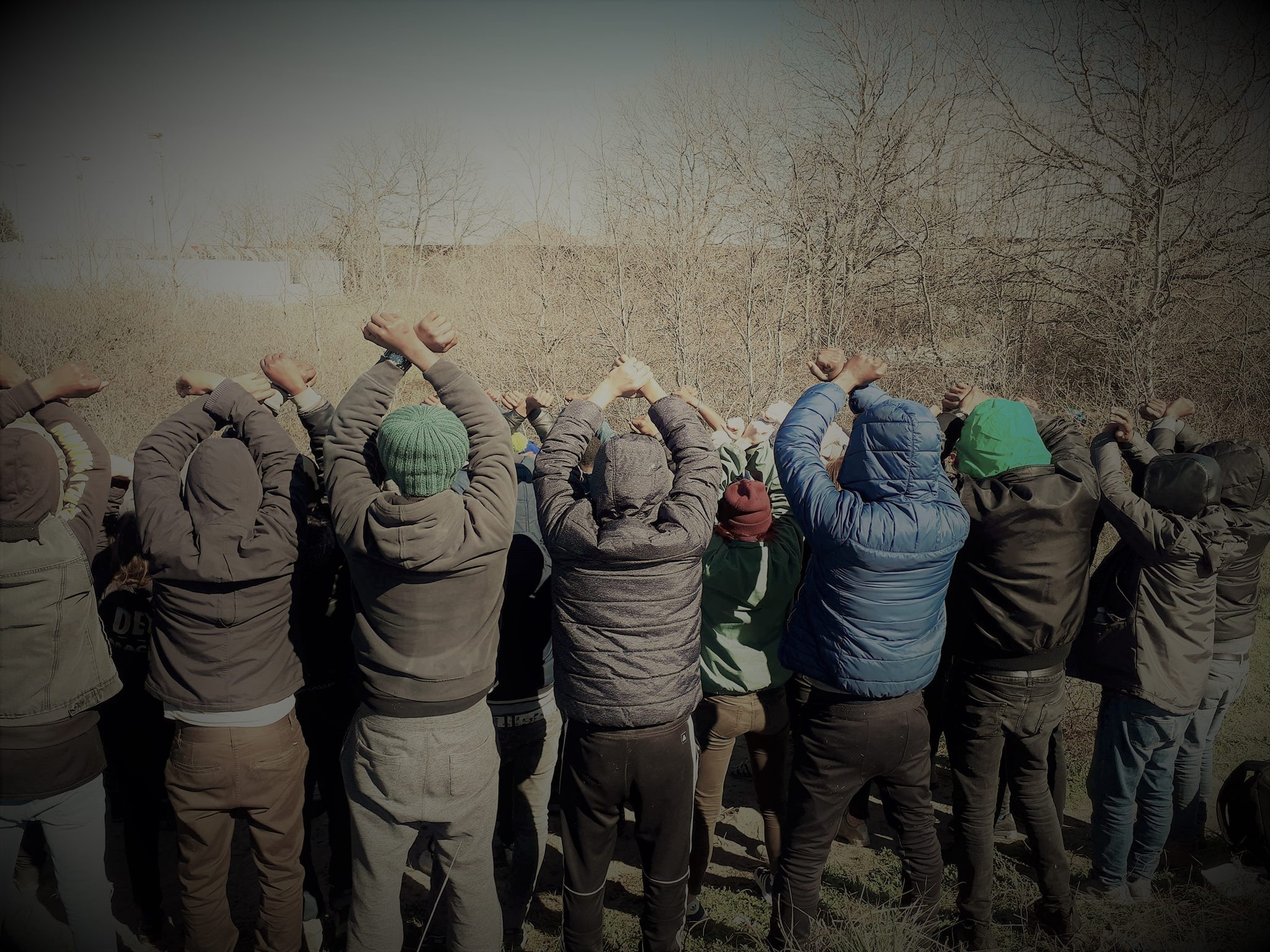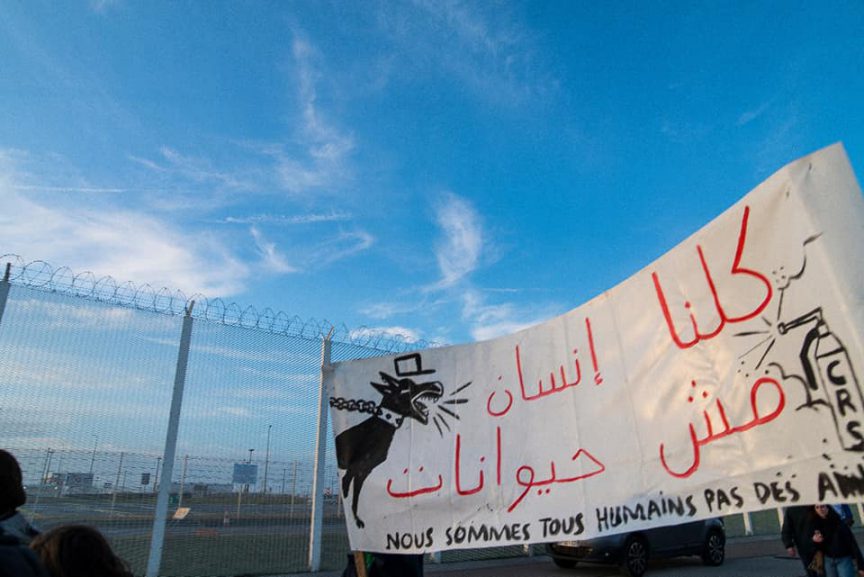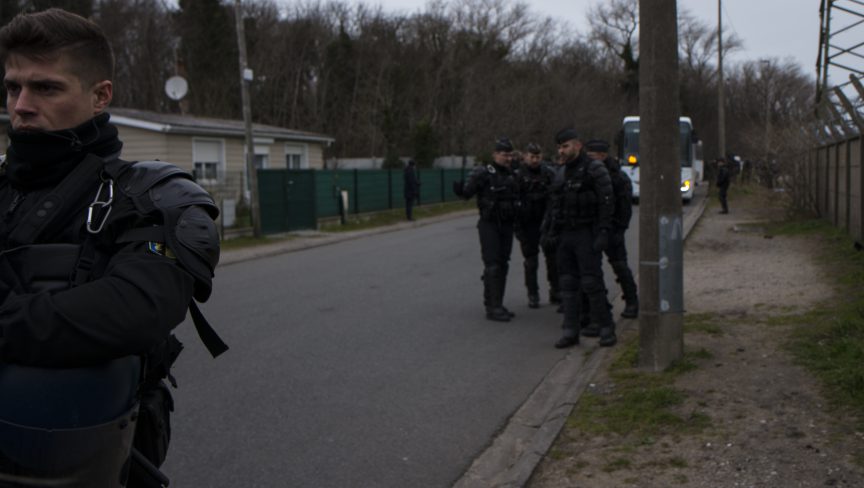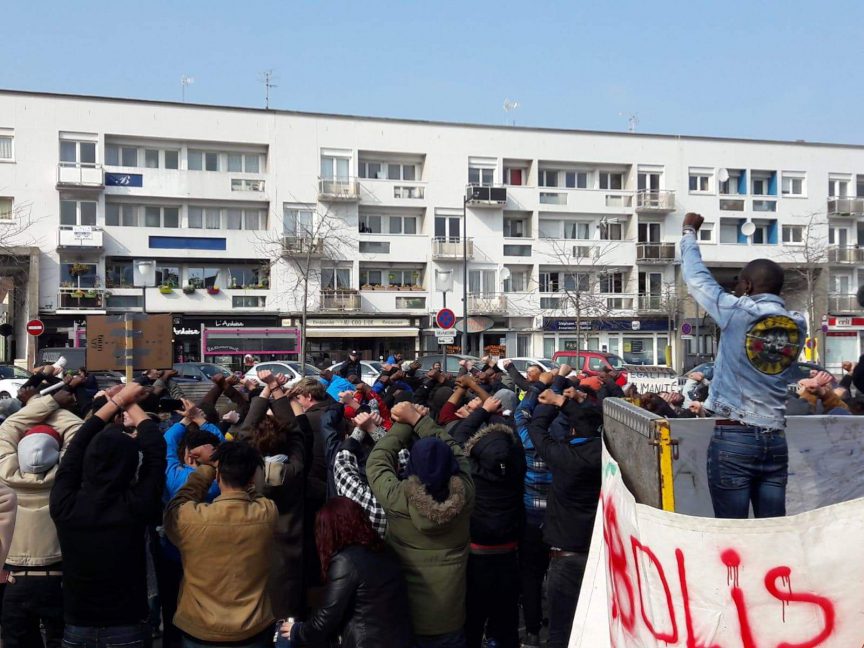Tired of Being Ignored, Refugees in Calais Are Learning to Do Their Own Press
by Abby Meadows in Northern France and Charlotte England in London
7 July 2019

On a sunny afternoon in June, thirty people from Sudan, Iran and Ethiopia gathered in the quiet back room of a local day centre near the port of Calais in northern France. One man volunteered to translate from English to Arabic so everybody present could understand, as a coach explained how to take control and set the agenda when speaking to journalists.
Tired of being ignored or misrepresented, refugees stranded at the British border had arranged for a media trainer to travel from London to deliver a crash course in dealing with reporters ahead of World Refugee Week, which they marked by organising their own press conference.
Matthew Butcher from the New Economy Organisers Network (Neon) – a group better known for teaching young British leftists how to hold their own in television debates than for assisting refugees – listened to participants’ needs before honing in on how to make clear and concise arguments and how to avoid being steered off message.
At the press conference on 20 June, refugees who had completed the training invited journalists to hear them confidently denounce their living conditions and condemn the system that has left them stranded in the French city.
(Video by Jackob Bowd)
This year has seen a major shift in the voices defining the crisis in northern France. Until recently, reporting on the situation was based predominantly on interviews and commentary given by European volunteers working in Calais and Dunkirk, rather than refugees themselves. Often this was because refugees were afraid speaking to the media could jeopardise their asylum claims if they did manage to reach the UK, particularly if they were misquoted or identified when they asked not to be. It was also because of the way in which humanitarian organisations function, which is too often by deferring to the opinions of aid workers rather than platforming the voices of refugees themselves.
There is a sense now in Calais that things must change. Frustrated with the lack of political solutions organisations have been able to provide, and generally tired of hearing advocates speak on their behalf, refugees have begun actively working to overcome obstacles to making themselves heard.
The situation in Calais has been stagnating since ‘the Jungle’, a camp of around 8,000 refugees, was bulldozed in 2016. For the past three years, displaced people have been living in destitution, scattered around the city. Many say they feel forgotten. This has bred a new desire for media attention, in the hope awareness could bring about radical changes to how people are permitted to migrate in Europe. But rather than basic coverage of their plight, refugees want their political demands to be centred in a new wave of reporting.
Those involved in pushing for change know setting the agenda when dealing with journalists is going to be a challenge. During the media training last month, an Ethiopian man said he often found himself backed into a corner by the reporters who visit the makeshift camps and squats where refugees live.
Although he believed there was a need to engage with the press in order to build public awareness of the situation in Calais, he felt most reporters “clearly had an agenda of what they wanted to be said”, and he found it difficult to push back against this. He struggled despite already having had a form of media training back in Ethiopia, an advantage most refugees don’t have.
Rising to the challenge, Butcher responded with specific interventions refugees could use to set the agenda themselves. Break your message down into three points, he said, and practice so you are able to summarise these in sixty seconds. The more concisely you can deliver your argument, he explained, “the less likely it is you can be misrepresented with sneaky edits and cuts”.

Planned in regular community meetings in the weeks preceding it, the 20 June press conference took place at the same Secours Catholique day centre as the media training.
Three microphones and five chairs faced a room of fifty people, mostly other refugees, but also solidarity workers and a few journalists who were able to attend last minute. With the cameras behind them to protect their identity, Taha, who had translated from English to Arabic during the media training, was the first to speak.
“We would like to welcome you all to this conference, as it is coming from the refugees themselves, not organisations, not anybody,” he said. “We would like to speak about the situation here, the people that are here, why they are here and how we can solve this problem”.
After paying respect to Allah, Taha addressed his community in the French town, where a recent charity census found around 25% of refugees are Sudanese like him.
Referring to his home country – where an ongoing civil war in the south has forced four million people to flee since 2013 – Taha suggested that a disregard for human rights is unsurprising in places outside of Europe that are ruled by unaccountable dictators. But, he continued, it is shocking that refugees are not met with justice when they arrive in European democracies like France.
“I am running away to Europe for peace, humanity, equality, justice, and protection,” he said. “But instead we face unfair fights for our freedom of movement, face the struggle of deportation, marginalisation, brutality of police in many countries in Europe.”

The press conference is part of a larger mobilisation of refugees in Calais this year. Central to this is Collectif Appel d’Air, a grassroots migrant group that has been instrumental in organising protests and raising awareness on social media. One of the groups key messages is that the Dublin system must be reformed to allow migrants to apply for UK asylum at the border.
Currently, most refugees are fingerprinted upon arrival in Europe to assist the Dublin system. The fingerprints are entered into an international database, which is then used to prevent them from claiming asylum in any country other than the one they first arrived in.
As a result, refugees can get trapped in limbo in peripheral states like Greece, Italy and Hungary where they don’t speak the language and don’t have friends or family. Some make it to France without getting fingerprinted, only to find there is no way to enter the UK – despite many speaking English or knowing people in the country – and they cannot apply for UK asylum at the border. This incentivises hundreds of migrants, particularly young people, to try and cross the channel illegally each year. There aren’t any official statistics on the number killed, but No Borders activists have recorded 65 deaths since 2015. Most people who die, drown, suffocate in the back of a lorry or are run over after falling from a vehicle. There have been two deaths already this year, most recently a young Eritrean man who was killed on a motorway in May.
“Refugees flee their countries out of fear, for better opportunities and freedom,” Collectif Appel d’air says in its mission statement. “But this isn’t what happens upon arriving in Europe… because of the way the Dublin regulations work, many consider [reaching] the UK [by illegal means] as their last option. These treacherous regulations push people to risk their life at the border”.
Beyond Collectif Appel d’Air, a similar movement has formed in Paris. In May, the ‘Gilets Noirs’ protested forced deportations at Charles de Gaulle airport, with several hundred undocumented migrants occupying the building.

If changing the asylum system is an ambitious demand, a life without police harassment is a far more modest ask from the communities displaced in northern France.
At the 20 June press conference, a local French journalist asked about police violence. An Eritrean man stood up beside him. “They come for us at night and they beat the people who are sleeping,” he said. “[They] wake us and they took a knife and cut our tents.”
He added: “It doesn’t seem possible to have freedom in Europe. And that’s why we are here to explain our situation to people”.
(Video by Jackob Bowd)
The latest report from the volunteer group Human Rights Observers states there have been 803 evictions in Calais and the Grande Synthe area of Dunkirk this year. One of the reports authors described the process as a ‘form of slow torture’.
While the political situation at the British border is stagnating, the current refugee-led movement is gaining momentum by the day. Trainings and political actions are already scheduled to take place throughout the summer. On the ground, there is a sense that a very different space is forming to the rhetoric around assisting refugees seen from volunteers and charities in the past; ideas and initiatives from refugees themselves are taking precedence at last.
Back at the press conference, Taha delivered perhaps the most poignant line spoken at the event.
“We are fighting every day against the border,” he said, “which is open widely for the white man. And his dog. And his cat…
“[But] not for me and my brother who die trying [to cross] under the trucks”.
His words lingered in the air, as supporters and journalists in the audience sat quietly.